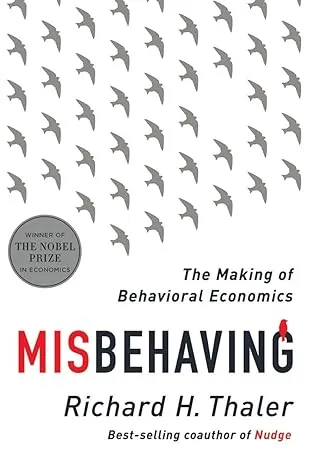About this book
Five Key Takeaways
- Perception often drives emotional reactions over objective reality.
- Mental accounting distorts financial decision-making and prioritizes budgeting.
- Self-control issues complicate choices between immediate desires and long-term goals.
- Fairness perceptions significantly influence economic behaviors and transactions.
- Behavioral economics reveals irrational decisions challenging traditional economic models.
-
Perception Shapes Decision-Making
People often make decisions based on perception rather than objective reality. For example, students misinterpreted their exam scores despite no effect on final grades (Chapter 1).
This happened when grades were presented differently, creating false satisfaction or disappointment. Their happiness hinged more on raw scores than actual performance.
Such irrational behaviors contradict economic theories that assume humans act rationally. Instead, emotions and perceptions significantly influence choices.
Traditional economics overlooks these "supposedly irrelevant factors," which behavioral economics identifies as key to predicting real-world behavior.
Ignoring perceptions in economic models results in predictions detached from how decisions are made in reality.
By incorporating human psychology, policymakers and economists can craft better systems and policies aligned to actual behavior.
For instance, recognizing perception's role allows businesses and educators to communicate outcomes more effectively to influence satisfaction.
-
Leverage Mental Accounting
People frequently divide their finances into mental "accounts," impacting decisions like saving, spending, and risk-taking. Awareness of this can drive smarter choices.
Avoid overspending in certain areas by treating all financial categories as part of an overall budget. Consider overall priorities instead of isolating "special funds."
For example, don't justify splurges using “bonus money.” Instead, evaluate all money as equal to reduce irrational financial behavior.
Reframing mental categories boosts financial health because it prevents emotional mismanagement and risk behaviors like overspending perceived excess funds.
Over time, aligning spending with core goals helps achieve budgets efficiently while reducing consumer stress about fluctuating accounts.
Marketers use mental accounting to sway us, like offering discounts that might undermine financial decisions. Awareness protects your interests!
-
Fairness Impacts Economic Choices
Emotional perceptions of fairness heavily influence economic behavior. People react against perceived unfair pricing, such as businesses raising costs during emergencies (Chapter 4).
Studies reveal customers value perceived fairness over utility, contradicting the traditional economic assumption that individuals always act to maximize benefit.
Emotional responses, like outrage at "exploitative" prices, can damage reputations and customer loyalty, compelling businesses to reconsider practices.
Fairness even shapes broader economic systems, as trust fosters sustainable success in customer relationships and regulatory trust alike.
In the long term, businesses emphasizing fairness build reputations for reliability, retaining customers even amid competitive challenges.
By recognizing fairness's significance, firms may avoid short-term gains that sacrifice repeat customers and long-term sustainability.
-
Build Better Savings Habits
Saving money is often hampered by psychological barriers like procrastination and emotional disconnect with long-term goals. Small adjustments can make a big impact.
Engage with programs like Save More Tomorrow, which ties contribution increases to future salary raises, avoiding immediate financial strain.
Switch to default savings plans, such as auto-enrollment retirement accounts, which use human inertia positively to boost participation rates.
Such strategies work because they align with behavioral tendencies, making savings less effortful and more embedded in financial practices.
Consistent saving improves financial security, reduces stress, and ensures better preparation for retirement or emergencies.
Without such behavioral frameworks, individuals risk lower lifetime savings and financial instability when unexpected expenses arise.
-
Behavioral Economics Is Transforming Policy
Traditional economics fails to account for how psychological and emotional factors shape decisions. Policies assuming rationality often miss their mark.
Despite the extensive use of economic models, countless decisions deviate due to cognitive biases and irrational actions. Ignoring this creates inefficient policies.
The author argues behavioral insights—like defaults in savings—resolve real-world problems more effectively than abstract economic predictions (Chapter 8).
Critics challenge behavioral economics for undermining rational models, yet its stronger empirical results prove it essential for practical solutions.
For instance, nudges built around human tendencies to procrastinate have revolutionized retirement planning, leading to increased savings rates.
Combining psychology with economics presents undeniable advantages in designing policies that resonate with real behavior, guaranteeing higher success rates.
-
Financial Biases Drive Market Fluctuations
Markets are influenced significantly by psychological biases rather than complete rationality. Behavioral finance reveals how emotions disrupt pricing (Chapter 6).
Examples include overreaction to new data, which distorts trends and creates volatility. Investors focus on emotions above intrinsic asset value.
Herd mentality among traders amplifies swings. Expert investors are not immune to this, contributing to trends like speculative bubbles or panic-driven crashes.
Understanding these biases unveils new opportunities for smarter financial investments through managing reactions amidst fluctuating confidence or fear.
For example, using behavioral insights, investors may counteract crowd psychology, improving chances of sustainable profitability based on fundamentals.
-
Human Irrationality Challenges Rational Models
Traditional economic theory promotes rational choice as a core assumption. Yet real-world behaviors often contradict this foundational belief.
Instances like the Ultimatum Game reveal how fairness, loss aversion, and framing dominate decisions. Rational agents often give way to emotional reactions.
Thaler champions abandoning rigid adherence to rationality in favor of acknowledging emotional, impulsive choices that align closer to reality.
He critiques economic orthodoxy, emphasizing how a focus on faults like bounded rationality makes economics more effective (Chapter 5).
Applying behavioral ideas shows models that embrace irrationality enhance explanations of practical issues like marketing strategies and lawmaking debates.
-
Use Commitment Strategies
Self-control struggles often derail long-term goals. People need tools for aligning daily behavior with aspirations like saving for retirement or eating healthier.
Set "automatic" mechanisms like scheduled savings transfers or removing temptations from view. For example, hide snacks to avoid impulse eating.
Use public commitments like accountability partners when adopting life changes. Having someone invested in your success boosts follow-through!
These steps work because they reduce reliance on willpower, which is often inconsistent. Automating choices ensures continuity.
The payoff is consistency: better finances, healthier habits, or academic success—without overwhelming effort or constant mental battles!




















